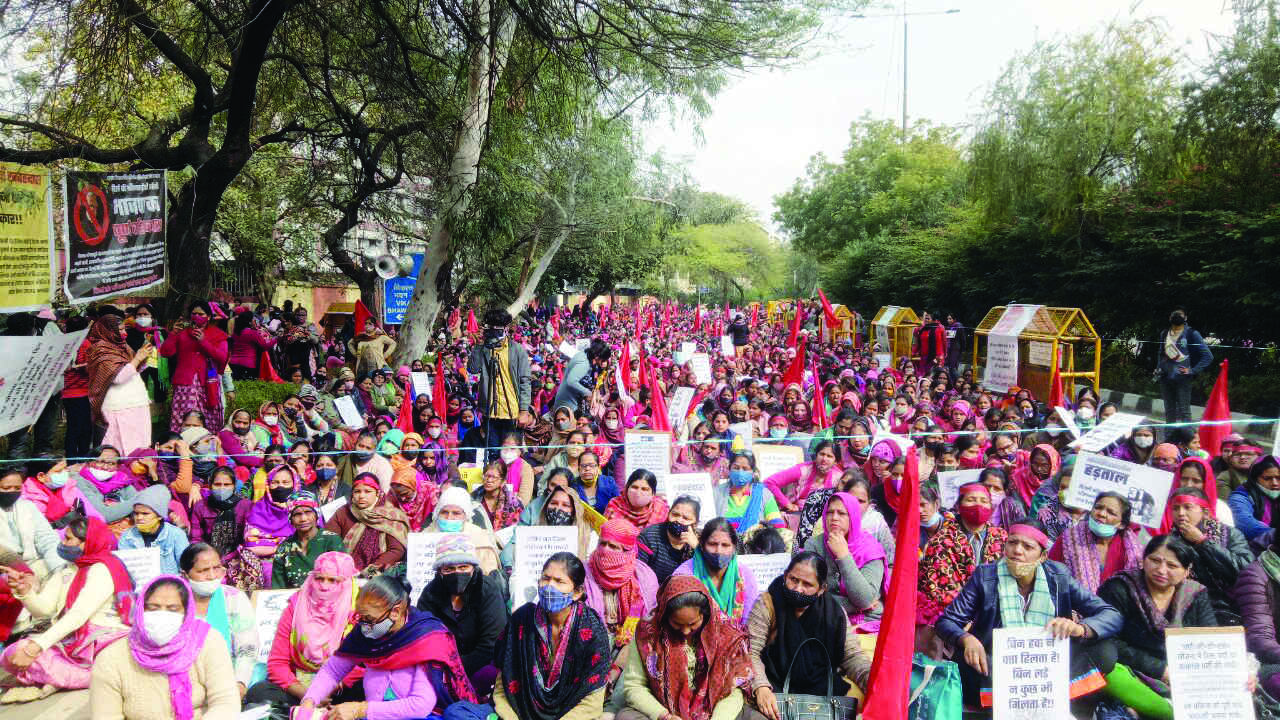Paid pocket money in the name of salaries: Striking anganwadis

New Delhi: Avantika Giri's typical day starts at 5 am. After finishing household chores, she wakes up her children, cooks, and feeds them before dropping her elder daughter (10) off at their neighbour's home — where she attends online classes — and leaving for work with her 2-year-old son. Giri is an Anganwadi worker in Delhi's Taharpur area.
But for the last one week, Giri and her toddler have been coming to Civil Lines every day to join thousands of other anganwadi workers like her to protest against the Delhi government and the Union government — seeking fair wages, employment benefits and a government employee tag.
According to the Delhi State Anganwadi Workers and Helpers Union (DSAWHU), which called for the indefinite protest last week, the last time anganwadi workers' "honorarium" was raised was in 2017 and that too after continued protests. Following this, the Delhi government had in 2019 issued a notification prescribing further cuts in this amount.
"I don't have anybody at home to look after my children. My husband is a contractual driver and he's on the road for most of the time. I was a little wary about bringing the little one to the protest in the midst of Covid but there's no other alternative", Giri (38), who has been an anganwadi worker for more than a decade now, said.
Her routine work includes reaching out to and providing any sort of assistance to lactating mothers, upskilling a group of five-year-old children, ensuring cooperation in her community and participating in immunisation drills, including the Covid-19 vaccination programme.
Giri, like most anaganwadi workers, gives more than 8 hours daily to her day job and she and her family have forever been struggling to make ends meet and more so since the pandemic. "After Covid, my husband's income has halved. We have a combined earning of around Rs 15,000 a month now. We have to eat and feed the children but with this honorarium, in this inflation, I don't know how long we can sustain ourselves."
Not far from Giri is Nagita Sharma from Delhi's Nangli. Seated on a tarpaulin sheet, she is fully engaged in the protest but also has one eye on her ten-year-old son, who attends online classes at a creche set up the union near the protest site.
"My husband expired a few years ago and I am the sole earner in the family today. My net pay is Rs 9,735. The government says women should study and work just like men but when it comes to salary, we get pocket money. I frequently have to borrow money to run my house" she said.
The anganwadi workers have already said that the current strike is indefinite and that they are not budging until their demands are heard. Hundreds, sometimes thousands of anganwadis and their helpers join the protest every day even as several other workers' unions have shown support to their cause.
"To help the women who are coming with children we have set up a nursery with toys, books and copies where our sisters can leave their children safely. They can play or attend their online classes. All we want is for more Anganwadi sisters to come and join in and amplify our voice, we're not bothered how the ruling dispensation comes at us," Vishal Kumar of the DSAWHU told Millennium Post.
But after being pacified every time they protest with "small wins", this strike for the workers is more than getting their salaries hiked, they say, adding that it was now about being treated as a crucial human resource, without whom grassroots public health infrastructure in the country would collapse.
Nagita said they are treated like volunteers and often looked down upon by the administration. "We want full assurance that we will get the tag of government employees. My son looks up to me and it's my responsibility to provide him the basic necessities and for that, I have to be there," she says, recalling how she had to immediately join her centre after she recovered from Covid-19 during the peak of the Delta wave.
She said she was bedridden for almost a month when she was infected last year. "We had to go and visit Covid hotspots in the community and spread awareness and also looked after pregnant women. We didn't get any sort of assistance like masks or sanitisers from the government. It is high time we raise our voice for our dues which must have a salary hike, PF and ESI," she said.



